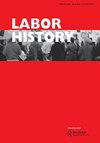性别、性别和身体:阿萨姆邦殖民地茶园的女工
IF 0.7
4区 管理学
Q1 HISTORY
引用次数: 1
摘要
“劳动史”作为一个学术领域的发展,为性别、性与身体理论注入了新的方向。性暴力和性别压迫事件长期以来一直是人类历史上残酷的一部分。在当代,随着历史学家开始对历史进行性别重新评估,尤其是在印度这样的国家,种植园社会终于受到了批判性的关注。本文旨在检索殖民时期阿萨姆邦茶园性暴力的几个账户。它还展示了茶园的殖民主人(Sahibs)如何压迫阿萨姆邦茶园男女工人的身体/性化。本书还试图重建两个被遗忘的茶园工人阶级妇女的故事,Mangri Orang(别名Malati Mem)和Durgi Bhumij(别名Durgi Mem),她们被欧洲茶园种植者性侵犯。从她们被物化为性感的身体开始,二人后来加入印度的自由斗争,成为自由战士,显示出她们的能动性。本文分析了阿萨姆邦历史上茶园女工被压迫/性化的身体与殖民资本主义父权制之间的联系。本文章由计算机程序翻译,如有差异,请以英文原文为准。
Sex, sahibs and bodies: women workers in the tea plantations of colonial Assam
ABSTRACT The recent developments in the evolution of ‘labor history’ as an academic field have injected new direction into theories of Gender, Sex and Bodies. Incidents of sexual violence and gender oppression have long been a brutal part of human history. In contemporary times, plantation societies are finally receiving critical attention as historians embark on gendered reappraisals of history, especially in countries like India. This article sets out to retrieve several accounts of sexual violence in the tea plantations of Assam during the colonial period. It also shows how the colonial masters (Sahibs) of the tea gardens have oppressed/sexualized the bodies of men/women workers in the tea gardens of Assam. An attempt is also made to reconstruct the forgotten stories of two tea-garden working-class women, Mangri Orang alias Malati Mem and Durgi Bhumij alias Durgi Mem, who were sexually abused by the European tea planters. From their objectification as sexualized bodies, the duo later showed their abilities of agency when they joined India’s freedom struggle and transformed into freedom fighters. The paper analyzes the connections between oppressed/sexualized bodies of women tea plantation workers and the colonial capitalist patriarchy in the history of Assam.
求助全文
通过发布文献求助,成功后即可免费获取论文全文。
去求助
来源期刊

Labor History
Multiple-
CiteScore
1.00
自引率
28.60%
发文量
44
期刊介绍:
Labor History is the pre-eminent journal for historical scholarship on labor. It is thoroughly ecumenical in its approach and showcases the work of labor historians, industrial relations scholars, labor economists, political scientists, sociologists, social movement theorists, business scholars and all others who write about labor issues. Labor History is also committed to geographical and chronological breadth. It publishes work on labor in the US and all other areas of the world. It is concerned with questions of labor in every time period, from the eighteenth century to contemporary events. Labor History provides a forum for all labor scholars, thus helping to bind together a large but fragmented area of study. By embracing all disciplines, time frames and locales, Labor History is the flagship journal of the entire field. All research articles published in the journal have undergone rigorous peer review, based on initial editor screening and refereeing by at least two anonymous referees.
 求助内容:
求助内容: 应助结果提醒方式:
应助结果提醒方式:


